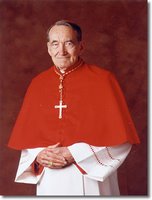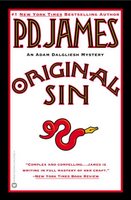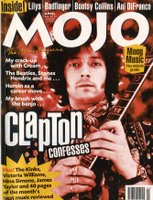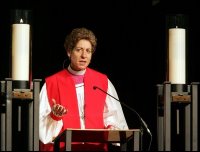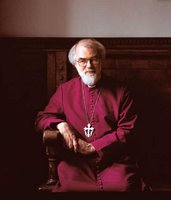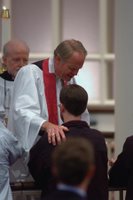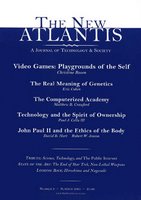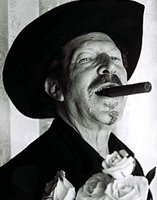
Fr. Sanderson sends along, for my edification and yours, Fr. Clarke's fine Christus Rex sermon, from St. John 18.33-37:
Everyone who is of the truth hears my voice.
In + nomine Patris et Filii et Spiritus Sancti. Amen.
They faced one another across the Judgment Hall, the Governor of the province and the Prisoner accused. Behind the Governor stood the cohorts and the legions with the centurions and the generals, an army which held in dominion the totality of the western world from the Rhine to the Sahara, from Hadrian’s Wall to the Temple Wall in Jeru-salem. Behind the Governor stood the Senate and the Roman people, and last but certainly first Tiberius Caesar himself, the greatest figure of the greatest empire since Alexander ruled the universe 300 years before. The empire itself was older even that that, tracing its civil and cultural lineage back 800 years, to the day when a she-wolf suckled the infant boys Romulus and Remus after their grandfather flung them into the Tiber River to ensure they would not challenge his power later. These kings knew how to protect their thrones. All this power, all this history, this fear and murder and blood and subjugation, all stood behind the Governor, and together they peered with furrowed brows and gritted teeth into the eyes of the Prisoner.
They faced one another across the Judgment Hall, this Prisoner accused by his country-men and the provincial Governor. Behind the Prisoner stood no one in particular –save perhaps a peasant woman and a youth, who would follow the Prisoner to the hill called Golgotha outside the city wall; but no one else: certainly not kings or emperors, neither legions nor generals, no one of any consequence whatever. Those standing behind the Governor all faced the Lonely Prisoner accusingly–yet oddly enough it was all the others staring at him whose brows were knitted in perplexity, for the Prisoner stood with confidence, the confidence of One who knows he stands clothed with the Truth.
“Are you a King?” demanded the Governor—demanding to hear from the Prisoner anything resembling a self-condemnatory YES, the final proof that the Prisoner was indeed guilty of sedition, treason, rabble-rousing, zealotry… oh, something, anything, to justify the sentence of death the Governor knew he must pronounce for fear of the mob, to protect his position.
Say it! Say anything resembling the YES I need so that I may satisfy the rabble you have stirred up, who now demand your execution. And why? What do I know of these crazy Jewish notions of imageless Temples and personal righteousness and blasphemous claims to divinity! Am I a Jew? I’ll leave the mumbo-jumbo for these back-water fanatics. Just give me the seditious YES I need.
“So you are a King?” The Prisoner continued to face the Governor across the Judgment Hall. His eyes did not drop, he did not shift from foot to foot. He returned the Governor’s gaze with the confidence of One who actually knows himself, and replied, “You say that I am a King. For this alone I was born and for this alone I have come into the world, to bear witness to the Truth. Everyone who is of the Truth hears my voice.”
It was then in the heat of the moment that the Governor’s mind ran out, that the Governor failed his countless supporters. “And what is truth?” he demanded—not remembering that you never ask a question unless you know the answer; not knowing that this question, when asked, answers itself; not realizing that with just that question the whole bloody imperial history of the world fell like so much dust and ashes into the scales—to be weighed, and found altogether lighter than vanity itself. For in that moment the Truth Himself unmasked all the world’s pretensions to greatness and power based on fear, murder, subjugation.
The big lies:
That might makes right,
That a majority vote is the voice of heaven,
That wealth or position or family offers immortal greatness.
The big lies:
That a State built on financial or military power, flying banners of science,
pluriformity, pro-choice, or what-have-you, may claim our total allegiance as if
that State were itself divine.
The big lies are revealed: as the King of Kings, the Truth Himself, stands in quiet humility before the RAGE OF HISTORY and says, “My kingdom is not of this world….” This King, with His motley crew of followers – a peasant woman, a youth, eleven reclaimed disciples, and those ten thousand times ten thousand who would follow him, offer the world a vision where MERCY, and not might, makes right. And all the empires, from suckling she-wolves to chopped-down cherry trees, find themselves so much dust and ashes, altogether lighter than vanity itself—as laughable as their proud, pathetic motto, “We have no King but Elvis.”
For Truth is the foundation of all heavenly dominion, Truth is the throne where sits the One Eternal King. Truth is He who reigned from a tree crowned with thorns bearing all the lust and hate of power-mongers, procurators, princes and presidents upon the nails driven through his wrists. Truth is He who died and was raised on the third day, saying, “My kingdom is not of this world,” he who says: Mercy, and not Might, makes right.
They face one another across the Judgment Hall yet, the Governor and the Accused, and their words are the same even in this hall today. “I have come in the world to bear witness to the Truth,” say the One. “What is truth?” asks the other. And the Judgment Hall is the human heart—yours and mine.
We are free to choose the Voice to which we shall listen.
In + nomine Patris et Filii et Spiritus Sancti. Amen.
Fr. Daniel Lee Clarke, ssc
curate, Church of the Holy Communion
